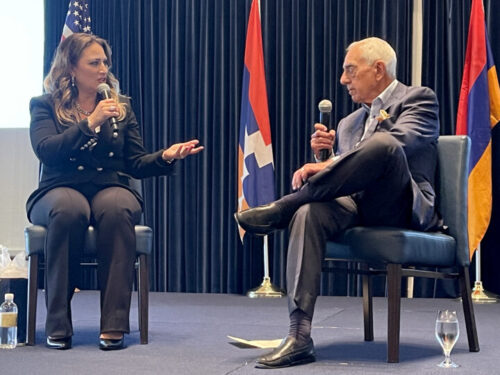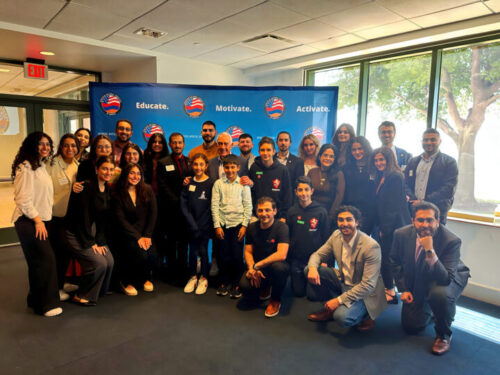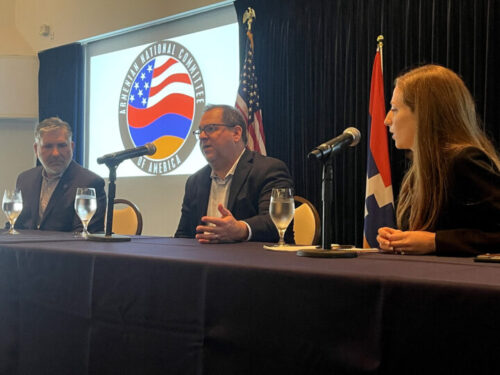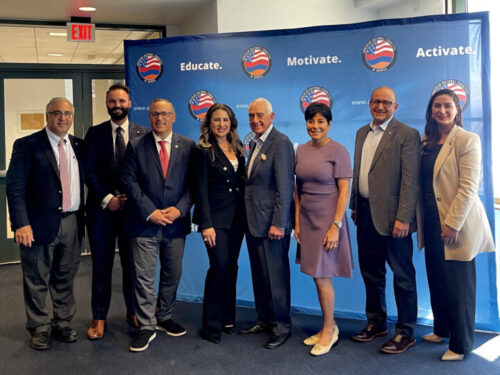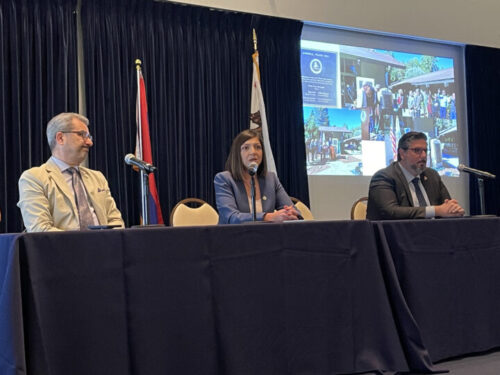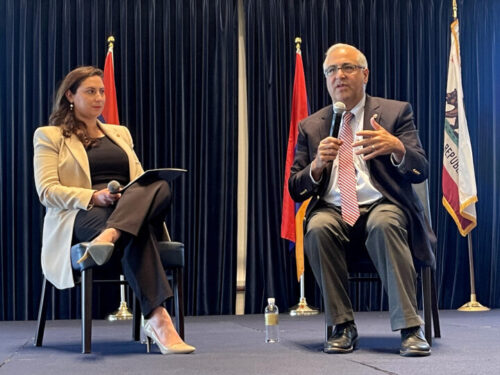ANCA Holds Policy Seminar at Ronald Reagan Presidential Library
Armenian-American Leaders From Across the Country Gather for High-Level Pro-Artsakh/Armenia Policy Discussions
June 8, 2023LOS ANGELES, CA – Over one hundred Armenian National Committee of America (ANCA) leaders gathered at the Ronald Reagan Presidential Library and Museum for an ANCA Policy Seminar, featuring a series of high-level panel discussions with preeminent Armenian American policy experts.
The invitation-only event brought together veteran ANCA community leaders and a select group of youth activists for a series of panel discussions and strategy sessions with experts in the fields of government, media, and public relations. Advocates from the ANCA’s San Francisco, San Fernando Valley, Glendale, Pasadena, Burbank, Crescenta Valley, Hollywood, San Gabriel Valley, and Orange County chapters, as well as leaders of the ANCA’s Nevada, Texas, and Colorado chapters, joined with Eastern US colleagues, representatives from the Armenian Youth Federation (AYF) and the Armenian Relief Society (ARS) – all of whom gained unparalleled insight into the most effective approaches for promoting grassroots political engagement and advancing our community’s federal legislative priorities through sustained advocacy.
During a panel discussion on civic activism and community engagement, Glendale City Councilmembers Ardashes “Ardy” Kassakhian and Elen Asatryan, alongside Rolling Hills Estates Councilmember and University of Southern California (USC) Professor Frank Zerunyan, discussed their respective journeys in the political arena, and how their Armenian identity has shaped their approach to serving in public office.
Over the course of the conversation, the councilmembers discussed strategies for the community to become more engaged in the political process – reflecting on the importance of the Armenian community’s civic participation, the value of Armenian-American voice in local and state government as a platform for amplifying issues of concern to the community, and strengthening ties between the local municipalities and communities in Armenia and Artsakh through sister-city agreements. Councilmember Zerunyan also highlighted his work at the local level – in a city without a large Armenian constituency – to establish an Armenian Genocide memorial in Rolling Hills Estates.
Following the panel, it was announced for the first time that Elen Asatryan will be running as a candidate for California Assembly District 44. Asatryan is a former executive director of the ANCA’s Western Region office, and the first Armenian-American woman to be elected to Glendale City Council. During her announcement, she reflected on the importance of preparing Armenian-Americans to run for public office, and the opportunity to ensure Armenian representation in the California Assembly.
For an in-depth exploration of the inner workings of the media industry, AXIOS Reporter Sareen Habeshian led a discussion with POLITICO’s Senior Politics Editor Charlie Mahtesian, and Senior Vice President of Edelman Public Relations Stephan Pechdimaldji about how the Armenian-American community can more effectively penetrate mainstream media – and offered advice to aspiring journalists in the Armenian community.
In a discussion that revolved around the ways in which Armenian-Americans can best engage with the media, Pechdimaldji offered advice as to the best practices for pitching stories drawing from his career working on the publishing side at some of the largest media companies in the U.S., and for one of the largest public relations firms in the world. Mahtesian, with a storied career as a national political editor for media outlets including NPR and POLITICO, provided insight into the transformation of the media industry throughout his career, the importance of engaging with new media platforms, and offered guidance on how to engage effectively with reporters. And Habeshian – who, prior to her role at AXIOS, worked as a digital producer at KTLA, where she extensively covered stories of interest to the Armenian-American community – reflected on the importance of having Armenian voices in the newsroom, and balancing the narrative against the false parity and ‘both-sideism’ prevalent in reporting on Armenian issues.
During a keynote ‘fireside chat’ discussion, ANCA Nevada Co-Chair Lenna Hovanessian was joined in conversation by Ken Khachigian, a titan of the Armenian-American community who worked on nine presidential campaigns, served as a senior aide in three presidential administrations, and California Governor George Deukmedjian’s gubernatorial campaigns.
During the conversation, Khachigian reflected on his career – from his early days interning for President Nixon’s campaign, where he rose the ranks to become an aide to his presidential administration. Khachigian discussed his relationship with Nixon, and his time assisting Nixon prepare his presidential memoirs – as well as serving as chief researcher for Nixon’s interviews with David Frost.
Khachigian also provided the audience with an intimate insight into his time working for President Ronald Reagan – from his start on Reagan’s campaign, to his pivotal role as the chief White House speechwriter, where he authored some of the president’s most consequential speeches. Khachigian shared the story of President Reagan’s Holocaust Memorial Day speech, wherein he became the first president to acknowledge the Armenian Genocide as a result of Khachigian’s internal advocacy within the administration. Khachigian also gave a moving account of President Reagan’s speech at the Bergen-Belsen concentration camp, noting how he drew from his own family’s experience during the Armenian Genocide as he prepared what is widely considered one of the most important speeches of Reagan’s career.
Following the fireside chat, ANCA Executive Director Aram Hamparian and Government Affairs Director Tereza Yerimyan delivered a presentation on the ANCA’s current legislative priorities – and highlighted the ANCA’s ongoing engagement with the Biden Administration to hold Azerbaijan accountable for its ongoing blockade and aggression against Artsakh’s Armenians.
The discussion included an overview of the H.Res.108 condemning Azerbaijan’s blockade of Artsakh, the Armenian Genocide Education Act (H.R.2803/S.1329) – introduced in both the House and the Senate – as well as upcoming legislation condemning Azerbaijan’s blockade to be introduced in the Senate by Senator Alex Padilla (D-CA) and Marco Rubio (R-FL). The conversation also provided an overview of the ANCA’s sustained engagement with USAID on the delivery of a humanitarian assistance strategy for Artsakh – as mandated in the FY23 Omnibus Appropriations Bill, championed by Rep. Barbara Lee (D-CA) – and the efforts to prevent the Department of Commerce issuing an export license for the sale of assault weapons to Azerbaijan. Hamparian and Yerimyan also announced an upcoming letter to be led by Rep. Barbara Lee calling on the Biden Administration to enforce – and not waive – Section 907 restrictions on military assistance to Azerbaijan.
To close the discussion, Hamparian and Yerimyan provided an overview of the ANCA’s youth programs – which aim to provide a pathway for Armenian-American students all the way from high school to grad school to pursue careers in Washington, DC. These include the ANCA’s Haroutioun and Elizabeth Kasparian Summer Academy, the Rising Leaders Program, the Lucine Kouchakdjian Capitol Hill Days, the Leo Sarkisian Internship, Maral Melkonian Fellowship, and the Hovig Apo Saghdejian Capitol Gateway Program.
ANCA National Board members Aida Dimejian and Zanku Armenian thanked participants and discussed next steps in expanding Armenian American grassroots participation, building on the expert advice provided throughout the conference.
The ANCA Policy Seminar builds upon a legacy of ANCA service to the cause of Armenian liberty that dates back more than a century, leveraging robust youth programs, vast grassroots reach in all 50 states, vigorous community engagement, and resilient coalition partnerships. The ANCA, as a grassroots Armenian American organization with chapters throughout the US, is deeply anchored in the community. The ANCA remains aligned with our enduring national aspirations – the security and survival of the Armenian homeland – while constantly updating our policy priorities and advocacy tactics to adapt to and overcome the challenges of a rapidly changing geopolitical landscape.
#####
